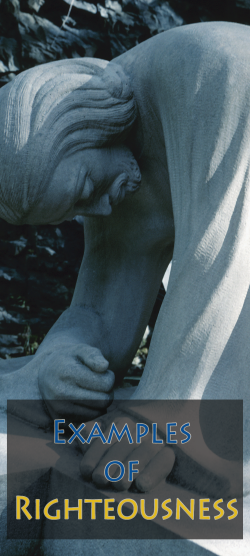
Examples of Righteousness
Balak, the king of Moab, wanted Balaam to come and curse Israel (Numbers 22:5-6). God told Balaam not to go (Numbers 22:12). Balak used gifts to try and get Balaam to go even though God still did not want him to go (Numbers 22:22). Balaam, instead of cursing Israel, blessed them (Numbers 23:1-11). In this passage Balaam said, Let me die the death of the righteous, And let my last end be like his (Numbers 23:10). In the middle of this blessing we find an important lesson. For one to die the death of the righteous, he must first live the life of the righteous. This is something Balaam failed to do. If we want to die the death of the righteous, we cannot follow the example of Balaam (2 Peter 2:15).
Righteousness is truly a biblical subject. The word “righteousness” appears 302 times in the Bible, and the word “righteous” is found 238 times in 225 verses. The Bible defines “righteousness” as simply doing that which is right (1 John 3:7-10; Acts 10:35).
In order for man to be pleasing to God he must be righteous for God is righteous (Matthew 5:6, 48; 6:33; Romans 1:17; Psalm 35:24). To do that which is right (righteousness) one must know what is right. One can know what is right. It is the word of God, the Bible (Psalm 119:123, 142; John 8:32; 17:17). However, it is not enough just to know what is right, one must do that which is right (Matthew 7:21-23; James 2:17-26; Romans 10:10).
The Bible records many examples of righteous people. Abel was called righteous by the Hebrew writer (Hebrews 11:4). Noah, Daniel, and Job were grouped together as those who were righteous (Ezekiel 14:14, 20). The apostle Peter called Noah a preacher of righteousness (2 Peter 2:5). Abraham was called a righteous man by the apostle Paul (Galatians 3:6). Abraham’s nephew, Lot, was also called a righteous man in 2 Peter 2:7-8. The parents of John the Baptizer were also described as righteous before God (Luke 1:5-6). Even Pontius Pilate, who did not believe that Jesus was the Christ, the Son of God, recognized that He led a righteous life (Matthew 27:19, 24). And indeed He was Jesus Christ the righteous (1 John 2:1).
Righteousness is truly a biblical subject. The word “righteousness” appears 302 times in the Bible, and the word “righteous” is found 238 times in 225 verses. The Bible defines “righteousness” as simply doing that which is right (1 John 3:7-10; Acts 10:35).
In order for man to be pleasing to God he must be righteous for God is righteous (Matthew 5:6, 48; 6:33; Romans 1:17; Psalm 35:24). To do that which is right (righteousness) one must know what is right. One can know what is right. It is the word of God, the Bible (Psalm 119:123, 142; John 8:32; 17:17). However, it is not enough just to know what is right, one must do that which is right (Matthew 7:21-23; James 2:17-26; Romans 10:10).
The Bible records many examples of righteous people. Abel was called righteous by the Hebrew writer (Hebrews 11:4). Noah, Daniel, and Job were grouped together as those who were righteous (Ezekiel 14:14, 20). The apostle Peter called Noah a preacher of righteousness (2 Peter 2:5). Abraham was called a righteous man by the apostle Paul (Galatians 3:6). Abraham’s nephew, Lot, was also called a righteous man in 2 Peter 2:7-8. The parents of John the Baptizer were also described as righteous before God (Luke 1:5-6). Even Pontius Pilate, who did not believe that Jesus was the Christ, the Son of God, recognized that He led a righteous life (Matthew 27:19, 24). And indeed He was Jesus Christ the righteous (1 John 2:1).
